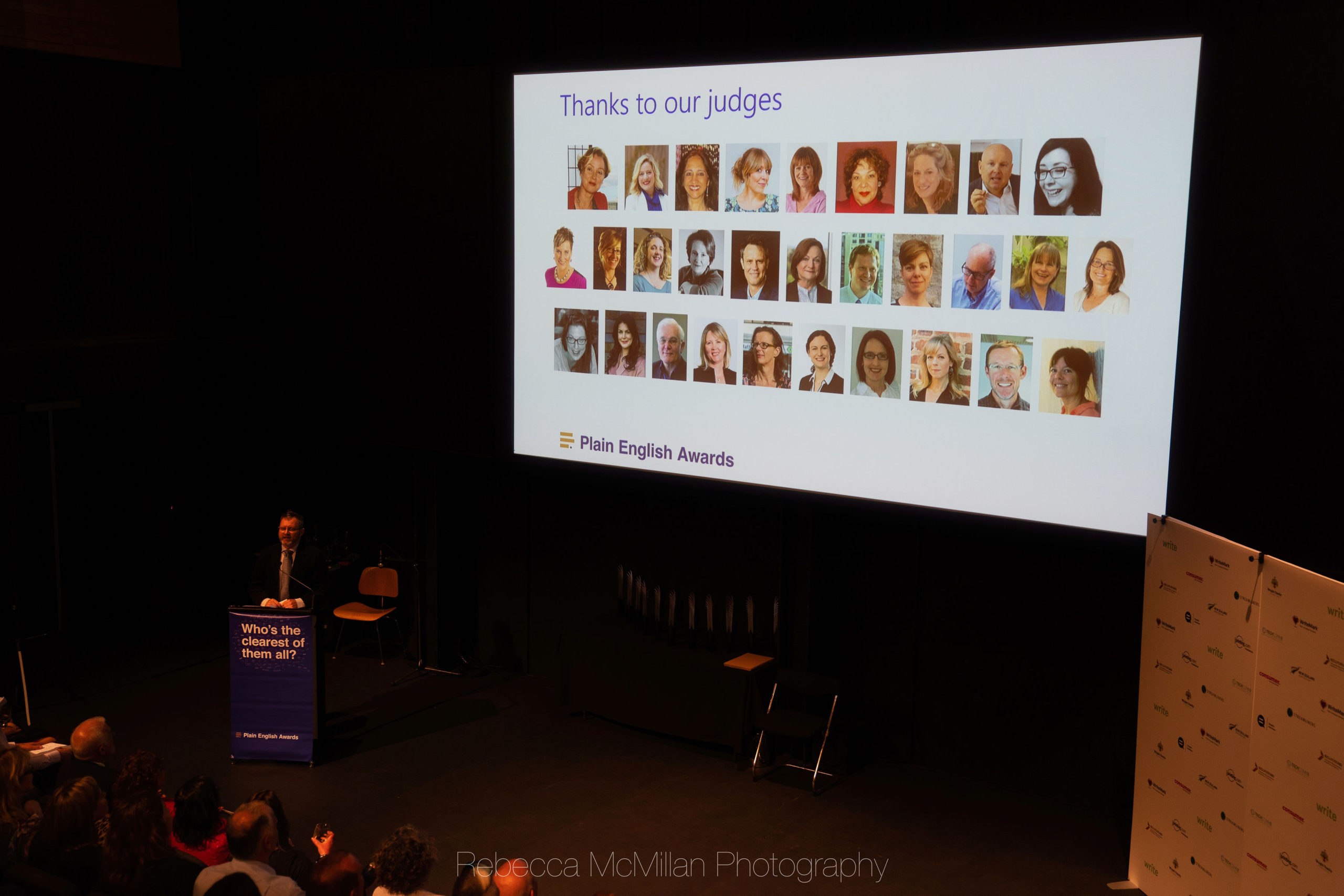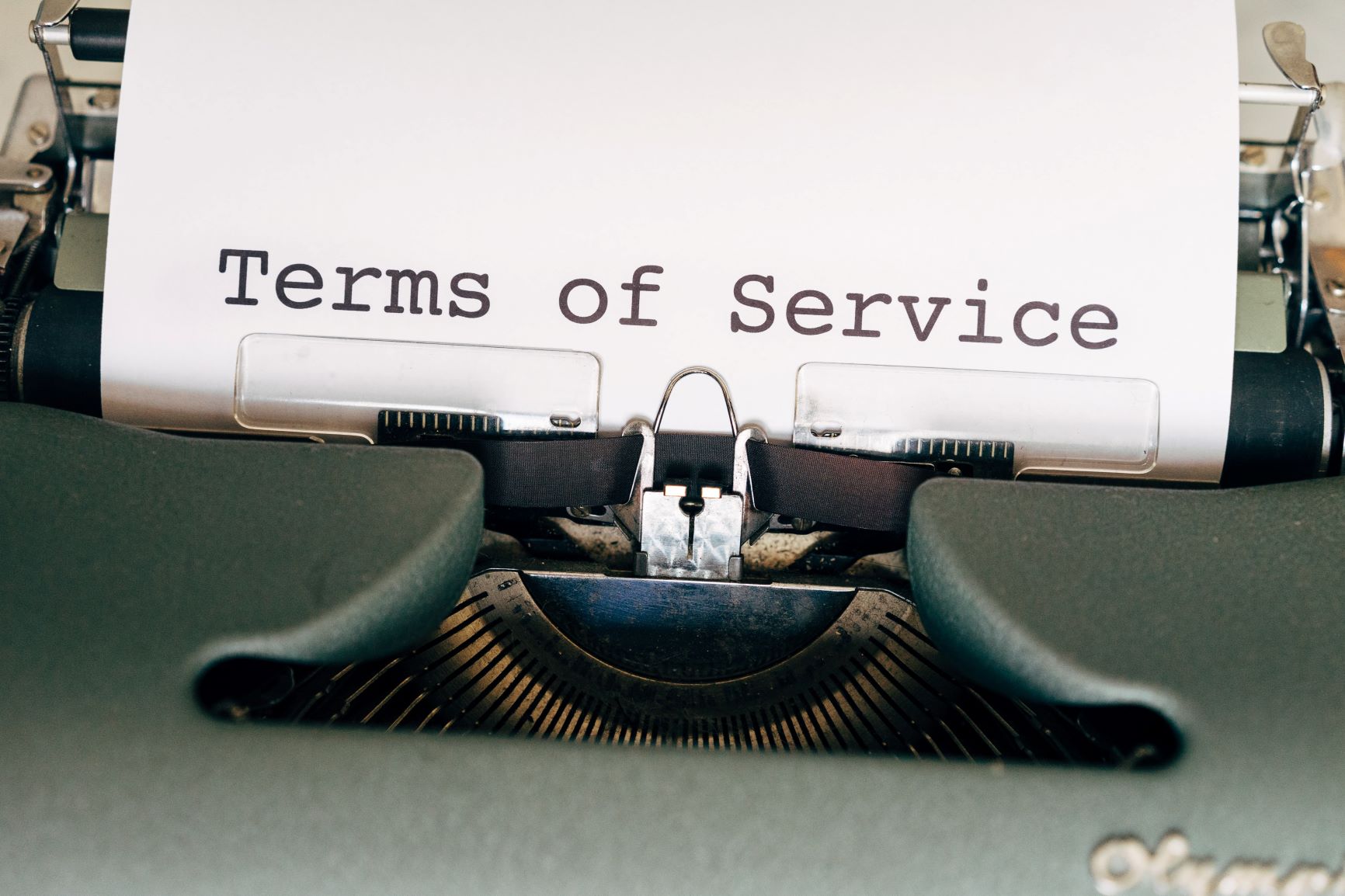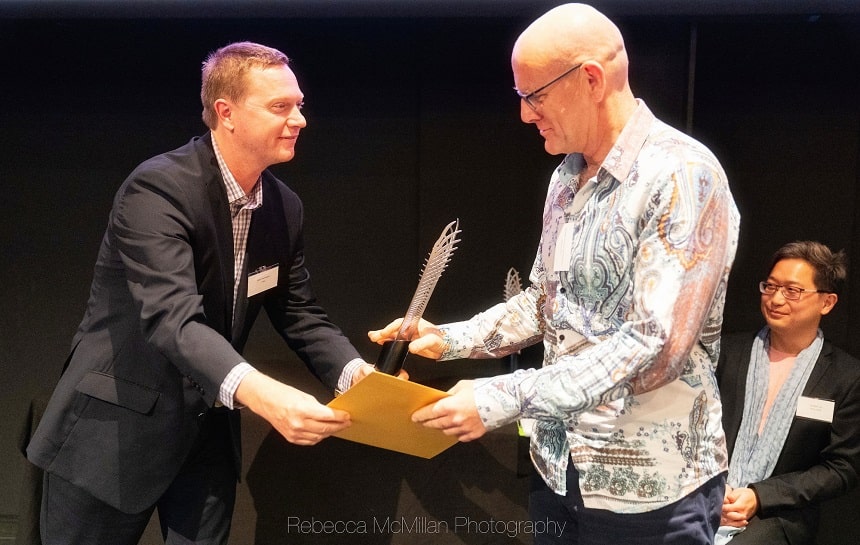
See your documents unfurl when you apply plain language principles | Photo by Lorraine Neill on excio.io
We asked Fraser Buffini, one of our new international judges for the 2022 Awards, to tell us a story of transformation. Appropriately enough, Fraser is one of the panel members judging the award for Best Plain Language Turnaround.
Fraser’s career began in the diplomatic world writing the very content he would later want to transform. His company is called The Clear Writing Lab and is based in Grenoble, France. It specialises in transforming content into clear English and training others to do the same.
In this article, Fraser explains how he uses George Orwell’s six rules for political writers to transform difficult content. He walks us through the thought process behind the way he edited a piece of legal writing and transformed it into something readable.
In my former life, I was an aide to the deputy head of a huge mission in the Balkans tasked with fixing the broken rule-of-law system after it imploded during a war. While it was a technical mission on paper, we were relentlessly dragged into politics.
Most of the time my job was to fix reports.
Now, in political writing truth is often kept just out of reach. That’s simply because of the way politics works: it’s about vying for narratives and pushing your agenda. If you do not have neutral anchoring principles, you absolutely will end up keeping the truth just out of reach of the reader. Not deliberately of course.
So where do you get these anchoring principles from? Well, there’s one place I’ll always go to that can be relied on no matter the context, no matter the content. In a 1946 essay, George Orwell wrote six rules for political writers that no one has bettered to this day. They are pure in their simplicity, easy to remember, and have genuinely stood the test of time. And they can be used in any writing, not just in politics. That’s why almost every newspaper style guide today is basically an elaboration on them:
- Never use a metaphor, simile, or other figure of speech which you are used to seeing in print.
- Never use a long word where a short one will do.
- If it is possible to cut a word out, always cut it out.
- Never use the passive where you can use the active.
- Never use a foreign phrase, a scientific word, or a jargon word if you can think of an everyday English equivalent.
- Break any of these rules sooner than say anything outright barbarous.

Fraser Buffini transforms unclear text into readable content | Photo by The Clear Writing Lab
Let me show you how I used these brilliant rules to rework a particularly bad piece of legal writing for a political report. This report had to be as neutral as possible. Here is the hot mess:
‘As abovementioned it was clear that the prosecutor was, inter alia, discontented with the deal that was hammered out henceforth allowing the defendant to walk free.’
Even before the Netflix logo has double-thumped the screen, let’s just delete the worthless bit of metadiscourse that is ‘abovementioned’ (Rule 3 – cut words if you can).
Ok, let’s start. ‘It was clear that–’ … hold on, clear how? Did something happen that made this clear? Did the prosecutor say something? Here is Rule 4 at play: that pesky passive voice throwing sand in our eyes.
Let’s send an email to the drafter of this report and ask them why they wrote ‘it was clear’. The drafter writes back later that day saying ‘well, she gave a statement to the press after the court hearing saying she was angry the deal went through’. That’s pretty useful information that could’ve been put in. Getting rid of the passive voice often helps us get closer to the truth.
Right, now we have basically deleted 20% of the sentence and already found out useful new information. The only text we have cleared so far is ‘the prosecutor was…’.
The next phrase, ‘inter alia’, breaks Rule 5 as it’s a foreign phrase and jargon (it means ‘among other things’). I get the feeling the drafter is ‘hedging’ here: I’m guessing they thought everything the prosecutor said was important and by focusing on one thing, it would reduce the importance of the other things. Let’s drop the drafter a quick email and find out what other things the prosecutor said. ‘Actually she just listed a bunch of legal clauses’, comes the response.
No new or useful information then. The drafter was definitely hedging. Let’s not get our limbs tangled up in the false safety net of comprehensiveness. Delete.
The next word is ‘discontented’. Rule 2 alert! It’s a long word where I think the shorter ‘unhappy’ will do.
Up next is ‘hammered out’. Rule 1 jumping into action here: this is a metaphor we see written all the time in print. Rule 1 is fantastic, since it makes us decide whether we create a fresh, new metaphor or we just remove it and replace it with something plain. I think for this report it’s better to say the deal was ‘reached’, than to come up with a fresh metaphor. However, we’re now in the pickle of the passive voice again (Rule 4): who reached the deal?
We call the drafter on their mobile to clarify: ‘oh it was a bail agreement the defendant’s lawyer made with the judge’. That sneaky passive voice hiding information from us again (Rule 4).
Next up is ‘henceforth’. I’m going to invoke Rule 3 here and declare that this word can, and should, be cut.
And finally, let’s have a look at that last phrase ‘walk free’. It sounds a bit like Rule 1 needs to be declared: I smell hints of a metaphor that we’re used to seeing in print. Let’s just go with the simple ‘released’ instead.
Our sentence now reads:
In a press conference after the hearing, the prosecutor said she was unhappy with the bail agreement the judge and the defendant’s lawyer reached, which allowed the defendant’s release.
Compare it with the old sentence:
As abovementioned it was clear that the prosecutor was, inter alia, discontented with the deal that was hammered out henceforth allowing the defendant to walk free.
The transformed version is much clearer, conveys more information and feels less wishy-washy. Somehow it feels more … honest.
As Fraser sums up:
Having a few guiding principles to fall back on can make a big difference. Using Orwell’s rules have been my go-to principles throughout my working life. Just by applying them, we have managed to unearth crucial new information, remove redundant and unclear phrases, improve clarity, and bring forth more truth.
There is a world of clear writing and plain language advice out there. But with Orwell’s rules, no one has given so much with so little.
Surprise and delight our judging panel with your best transformations
We want to see how you’ve transformed your content. Perhaps you’ve had feedback from readers who wanted changes. Or you decided to update your content into something more usable. Show us how you applied George Orwell’s writing rules or other plain language principles. Get your entries in before 31 July!
Read the criteria for the Best Plain Language Turnaround category
Read our 2021 blog ‘Anatomy of a plain English turnaround’
And remember, it only takes a sentence!
Read the criteria for the Best Plain Language Sentence Transformation
Read our 2021 blog ‘Transforming hungry caterpillars into beautiful butterflies’
Anne-Marie Chisnall June 30th, 2022
Posted In: 2022 Plain Language Awards, Plain Language Turnaround
Tags: Best Plain Language Sentence Transformation, Best Plain Language Turnaround, clear communication, clear thinking, Fraser Buffini, Legal writing, Turnaround

Thanking our judges at an Awards ceremony | Photo by Rebecca McMillan Photography
We asked our judges for some insider advice and tips to pass on to people considering entering the Awards.
And as usual, they were more than happy to help out!
We asked our judges:
- what aspects of an entry makes them think ‘this one is a winner’
- what their top piece of advice was for someone entering the Awards
- what common missteps they see that quickly let them know an entry won’t be a finalist
- what they thought were the most notable features of winning entries from past Awards.
This type of entry is a winner
One judge liked entries that surprised them and surpassed their expectations.
Others said, ‘First impressions are crucial. For me, if the structure is helpful and logical, the language simple and clear, and the tone friendly and engaging, then the authors will definitely be in the running to be winners’.
‘The language will be the equivalent of plain speaking — ordinary, everyday language throughout the text. The document will do the job the writer describes to us.’
‘I think for me that’s when I can feel that the writer has put the effort in to realise that they are writing for a reader. It might not be perfect, but you can tell that they are thinking about the receiver of the message.’
‘It’s how the authors weigh and balance the various aspects and elements of the communication — the audience and its needs, the situation and its urgency or characteristics, the political charge of the situation and people’s reaction, and how all of that has an impact on the message, tone, word choice, sentence construction, images — and when they tell me that they have talked to the intended audience, instead of just assuming they got it right. When all of these things are cohesive, I know I have a winner.’
‘Simplicity and clear evidence of designing the information for the audience.’
Our judges’ top pieces of advice
Our judges want entrants to put themselves in their readers’ shoes. They want you to forget about yourself and your message. Just ‘focus on your readers’, one said, and we agree. Your audience is, after all, what really matters.
Always put yourself in your readers’ shoes. You wouldn’t want to wade through dense, long-winded, jargon-filled reports. Neither do your readers!
Another common theme from our judges was:
Keep it simple!
Here are some other top tips from our judges.
- Don’t get in your own way.
- Leave your ego at the door.
- Brevity is the currency of good comms.
- Think outside of the box, talk to talk to your customers, ask them what they want and need, get to know them. And … surprise yourself!
- Avoid bureaucratic language, particularly impersonal, passive, or pompous sentences.
- Keep it short, sweet, and simple! (No one wants to read lots on a screen.)
- Make a human connection. Show that your piece reaches its audience and has results. Show that every decision was carefully made based on evidence, not assumptions. And even better, try to show documented results — fewer phone calls, more returned surveys, bills paid sooner.
Common missteps judges see in entries
Here’s more on what to avoid, with some examples from the judges of missteps in entries that didn’t make the grade.
Lack of focus on the intended reader
- Too much focus on their own story
- Using their company name over and over again, instead of using ‘us’ and ‘you’
- Text that suggested that the writer wanted the message or the organisation to seem important
Unclear purpose
- A lack of attention to the purpose of the entry. ‘With no ‘care’, probably no need to share…’
- Failing to talk about the goal of your piece in terms of what you want your audience to be able to do with the information
Language-related problems
- Using unfamiliar words in place of everyday words that most people will easily understand
- Too many words, repetition
- Vague language, jargon, or management clichés
Lack of testing or evaluation
- Not being able to show that you tested your piece with your intended audience, no matter how limited the testing
- Not being able to show how you used feedback to improve the document or website
Stronger editing or design needed
- Clumsiness in the writing
- Too much text and not enough white space
- Not being able to explain why you made a choice about design or word choice based on your intended audience.
- Overwriting — including information that just dilutes the purpose of the document — and a lack of tailoring
The most notable feature of past winning entries was putting the reader first
Judges all agreed that putting the reader first was the way to a winning entry. ‘Clarity and consideration of the audience’, said one judge.
Winning documents were thoughtfully and helpfully laid out, using clear and simple language, and in an engaging tone that inspired trust.
‘They all really moved into the heads of their readers’, one judge said. ‘What questions do they have? How can we answer those questions as clearly as possible? How can design help us? What tone of voice is needed?’
‘We have been unanimous in selecting entries that showed unusual skill, such as explaining bowel cancer with sensitivity and clarity. Others have explained complex topics in everyday language.’
‘I’ve only judged the Best Plain English Sentence Transformation before … ‘short and active’ were the two main ingredients!’
‘One of the most memorable entries I judged several years ago was a newsletter updating residents about a major road closure that was going to last several months. The details were highly technical; the inconvenience was very high for anyone who used the road. But the newsletter used similes and metaphors to explain the technical aspects; for example, ‘We need to remove the equivalent of two soccer arenas of rock’. The writer used humour and truth and, as a result, built the trust of those who read it. It could have been a boring weekly update, but instead was an engaging read in terms that even a non-engineer — who didn’t live anywhere near there — could understand. That was understanding the audience and the situation and creating something more.’
‘A conversational tone. And good design (white space, colour, graphics, and so on).’
Some extra wisdom from our judges
Our judges wanted entrants to enjoy the process. ‘The standard has been rising over time’, one said. ‘Even to be chosen as a finalist is impressive and should go in your CV. The ability to write in plain English is in demand around the world.’
Another judge added, ‘It’s a great way to get valuable personal feedback on your writing! And you support plain language for everyone, no matter what someone’s abilities or background are. A great cause.’
‘No matter the outcome for your entry this year, read the comments of the judges with interest. For the most part, they will give you insights on how to approach about your next communication in a richer way.’
‘Plain English is not an add-on to good business writing — it is good business writing.’
Read Trophy Tips: Top tips from past winners
Find out more about this year’s judges
Watch videos by some of our judges in our gallery
Nicola Welby July 5th, 2021
Posted In: 2021 Plain English Awards, Communications, Judges, Plain English Awards, Trophy Tips
Tags: clear communication, clear thinking, clear writing, Finalists, improved writing, insights, plain English, Trophy Tips Seminar, winners

Will you join our prestigious list of winners? | Photo of 2018 Award winners by Rebecca McMillan Photography
We asked past Award winners what appealed to them about entering the Plain English Awards, what advice or feedback they got from the judges, and what tips they’d give to anyone entering this year.
We hope you find these tips useful!
We asked our winners:
- why entering the Awards appealed to them
- what features of their entry the judges appreciated the most
- what they would do differently if they entered the 2021 Awards
- what their top piece of advice was for this year’s entrants.
Why entering the Awards appealed to our past winners
- ‘We knew what we were doing was important and wanted to share that with other people who care about plain English.’ (Plain English Champion winner)
- ‘I met someone years before who’d entered and won an award, so for me it was a development goal to work towards. I wanted to become good enough, consistent enough and confident enough in what I do to deserve one of these awards. I also wanted to connect with people in similar roles to me and support and celebrate their achievements too.’ (Plain English Champion, Best Plain English Sentence Transformation winner)
- ‘I believe plain English is so important in society and I wanted to be a part of making change. I loved the challenge of making a technical document plain!’ (Best Plain English Document — private sector winner)
- ‘I think good technical communication deserves to be celebrated, and I love a challenge! Plus I thought that if I won, the award would look good on my desk and in my CV.’ (Best Plain English Technical Communicator winner)
The judges appreciated easy-to-read letters with a personal tone and clear design
The judges appreciated documents that were well structured and elegantly designed. They appreciated that a team effort often plays a part in improving communication. The judges also felt enthusiasm for plain English coming across in personal tone and were impressed by the entrants’ dedication to using both plain English and smart design to make their organisation’s communications clearer.
Judges also liked seeing great layout, and technical language explained clearly.
One winner said that the most powerful thing they did was include quotes from people on a benefit. ‘We had people thanking us for sending them easy to read and kind letters.’
Our winners said they could always find room for improvement
One said, ‘I’d take everything I’ve learnt since I last entered, and talk about that — the challenges, the new thinking, the lessons learned, the new responsibilities, and the successes.’
‘I would include more about the difference it made to people’, said another.
One entrant entered an instruction manual that was designed for the web, including drop-boxes that opened on click. As this was not a public-facing website, the entrant had to provide the content in Word, which wasn’t ideal. They said that in future they’d choose examples that they could provide in a more accessible format.
Our winners shared their top pieces of advice for someone entering the Awards
- ‘You have to really care about your entry and what you worked on.’
- ‘Structure your supporting evidence well, to make the value you’ve added to plain communication really clear and convincing for the judges.’
- ‘Design is as important as the plain English words used. Your layout is an integral part of plain English, as are any design features used.’
- ‘It sounds obvious, but make sure you read “What you need to know” for the category, and make sure you provide judges with everything they are looking for.’
Some more words of wisdom from our winners
Our winners agreed that ‘plain English is underrated, yet crucially important’. They also felt it was fantastic to be part of the plain English movement.
A plain English document can win your business customers, save readers valuable time, improve your organisation’s credibility, and even save lives.
The Awards recognise that it’s not always easy to keep things simple — our project was really daunting — but it’s so important.
The Awards have a really fantastic celebratory vibe. Even if you don’t win, it’s a great achievement to be a finalist and support other finalists, and to be part of an important movement in New Zealand.
Thanks to all our past winners for their valuable advice! We hope all our entrants get as much out of entering the Awards process as valuable as our past winners have!
Read Trophy Tips: In the words of our judges
Read about past award winners
How to enter the 2021 Plain English Awards
Nicola Welby July 5th, 2021
Posted In: 2021 Plain English Awards, Plain English Awards, Trophy Tips
Tags: clear communication, clear thinking, clear writing, Finalists, improved writing, insights, judges, plain English, Trophy Tips Seminar, winners

The judges are looking for easy-to-read legal documents | Photo by Markus Winkler on Unsplash
What’s the number one thing a reader of a legal document is looking for? We’d like to suggest that it’s clarity! Readers of any writing — including legal documents — are looking for a document they can read once, understand, and act on.
Read the full version of a definition of plain language by the International Plain Language Federation
The award for Best Plain Language Legal Document celebrates legal writing that gets its point across without that legal flavouring that we’ve seen so often. How often have you encountered words like these in a legal document — furthermore, notwithstanding, prior to, accordingly? And what about commence, expedite, or terminate?
Let’s see some legal documents that push the boundaries of ‘plain’
The winners of the Best Plain English Legal Document in 2018, Draper Cormack, pride themselves on communicating clearly and directly with their clients. And the judges agreed that they were doing a great job of clear communication with their terms and conditions. The judges said:
This document is written in a way that gives the intended audience a strong chance of understanding it at the first reading, and in the way the drafter wants them to. It’s clear, direct writing, using as few words as needed, and avoids being ambiguous, lengthy or technical writing and complex sentences.
Overall, it is a good example of what you can do with a legal document.
The other finalists, Infinite Possibilities and Hatch, also made clarity a key feature of their communication with their customers.
Check out a legal document with a difference in the client relationship agreement from Infinite Possibilities
And take a look at Hatch’s terms too. The judges said:
Overall this document shows what plain English can achieve in the law. The target audience is written to in a language it can understand and act upon with confidence. The flow of ideas is logical and the design is clear and concise. [The document’s audience] would easily and quickly grasp its implications.
What the judges are looking for
The judges are looking for the best example of a legal document written in plain language. You can enter a document used in legal contexts or for legal purposes. Examples include contracts, agreements, terms and conditions, notices, deeds, judgments, legal opinions, and so on. The document may cover a legally enforceable Act, process, obligation, or right.
Here are the judging criteria. And remember the judges will also be keen to know if you’ve evaluated your document in any way, such as carrying out document user-testing.
Purpose
The purpose of the document is clear at the start, and the content supports the purpose of the document.
Structure
The structure is clear and logical to the reader.
Headings and main messages
The headings are informative and clearly signpost the main messages.
Paragraphs
The paragraphs are mostly short and focused on one topic.
Sentences
The sentences are mostly short and straightforward.
Words
The words are precise and familiar. Technical terms are explained.
Layout and presentation
The layout helps the reader absorb the messages quickly and easily.
Watch videos from our judges of the legal category in our gallery:
More about the Best Plain Language Legal Document category
Anne-Marie Chisnall June 9th, 2021
Posted In: 2021 Plain English Awards, Communications, Industry awards, Legal writing, Plain English Awards
Tags: 2021 Plain English Awards, Best Legal Document, clear communication, clear thinking, clear writing, improved writing, Legal writing, legalese, writing for the public

A beautiful handmade trophy is one of several prizes in store for Accuro Health Insurance. Image by A Beautiful Photo
Winners in the 14th annual People’s Choice Awards were announced by Awards media partner Newsroom last week. The People’s Choice Awards recognise the best and worst in government and corporate communications, nominated anonymously by members of the public.
Accuro Health Insurance comes out tops
The award for the People’s Choice — Best Plain English Communication goes to Accuro Health Insurance for their website.
See the official announcement on the Newsroom website
The person who nominated this website said:
It’s a beautifully clear, simple website. I found it clear and logical.
The international panel of judges said about this entry:
This website is a very good example of plain English used to support a business to communicate clearly and in an engaging way with as many New Zealand residents and citizens as possible. I’d expect it to have a positive impact on sales to new customers and existing customer retention and engagement.
This is a very strong site. It gives a great first impression, drawing the reader in from the start. This is then followed up by concise and engaging content, and a simple-to-navigate layout that makes it easy for readers to find and do what they need to.
[Accuro has] done a good job creating a user experience that is clear and helpful, which is refreshing for an insurance organisation.
Bad news for Auckland Council
The award for the People’s Choice — Worst Brainstrain Communication goes to Auckland Council for its Proposed Plan Change letter.
See the official announcement on the Newsroom website
The person who nominated this document said:
A good friend of mine came in waving her [copy of this letter] at me, saying she had a Master’s degree in English and couldn’t understand a word of it.
The international panel of judges said about this entry:
This document is very difficult to understand, which disturbs me because it seems very important for landowners. Also, the writer portrays the content as unimportant, but I don’t think it is so, and this makes me suspicious.
The council is trying to bring a planning change to the attention of its ratepayers and residents. But it has failed miserably to think about how to get that message across in plain language. [The letter] appears to be written for people who understand council processes, not for those who will be most affected by the change.
The third component of this communication is already written in plain language, so the skills to write the rest in plain language exist. This is poor performance for a very important matter, and a huge opportunity missed. Many residents were frustrated by this communication.
New Zealanders continue to benefit after 14 years
The People’s Choice Awards are held each year and form part of the Plain English Awards. The full Plain English Awards are held every second year. Entries for the 2020 Plain English Awards will open at the end of March 2020.
After 14 years of Awards, New Zealanders continue to reap the benefits of business and government using clear communication to engage with their clients, consumers, and customers. The Awards reinforce the element of care that lies behind reader-focused communications.
Awards founder (and CE of plain language consultancy Write Limited) Lynda Harris said care is one of the qualities associated with plain English that’s closest to her heart.
People who choose to communicate in plain English do, by definition, care about their readers. They put the needs of their readers first as they think and write. They care about people, impact, and outcomes.
Awards sponsors
Sponsors for this year’s Awards included WriteMark, Write Limited, Wright Family Foundation, Graphic Solutions, Newsroom, printing.com, MoneyHub, and Consumer NZ.
Other sponsors, whose contributions to the Awards were invaluable, are Editor Software (United Kingdom), JUNO Investing Magazine, and Kendons.
Find out more
See Newsroom’s official announcement of this year’s winners
Read what our winners and finalists had to say on our winners page
For more information, contact:
Gregory Fortuin, Chair, WriteMark Plain English Awards Trust
021 465 254
Anne-Marie Chisnall December 4th, 2019
Posted In: 2019 People's Choice Awards, Brainstrain, People's Choice awards
Tags: Brain Strain Award, clear thinking, clear writing, Industry awards, jargon, jargon-busting, People's Choice Awards, plain English, plain language, power of plain English, writing for the public

Judge Matt Huntington, left, hands over a trophy to last year’s winner of the People’s Choice Best category, Troy Churton from the Commission for Financial Capability. Photo by Rebecca McMillan.
Awards media partner Newsroom will announce the winners of this year’s People’s Choice Awards on Thursday, 28 November.
We can’t wait to find out which of our finalists have come out tops. And we’re very excited to have the support of Newsroom to help us spread the word.
James Elliott — our fabulous and funny MC at Awards presentations for the last 5 years — is continuing his support for plain language by being our star announcer.
All sorts of goodies await the winner of the Best Plain English Communication
We know our judges have been thinking long and hard about which of the top four nominations in their category deserves to win. What can the finalists, all supported by members of the public, look forward to if they win?
First of all, we’re pretty sure they’ll be celebrating their award, knowing that their communication has had a positive impact in the world.
As well, thanks to our wonderful sponsors, the winner will walk away with some fabulous prizes.
They’ll be thrilled to receive the iconic trophy in steel and bronze by Wellington sculptor Campbell Maud. They’ll enjoy using the latest StyleWriter plain English editing software from Editor Software to craft future documents.
And we think they’ll be excited to extend their skills with a place on any of Write Limited’s 1-day open workshops.
A little bit of fun for our Brainstrain winner
Our Brainstrain judges are all industry experts and take their roles very seriously. Even so, we always present the Brainstrain Award with good humour. That’s why the winner of the Worst Brainstrain Communication gets the famous Brainstrain rubbish bin filled with sour worms.

Who’ll win the notorious rubbish bin full of sour worms this year? Photo by Rebecca McMillan.
Winners of our Brainstrain category need serious prizes too! They’ll also get:
- the latest StyleWriter plain English editing software from Editor Software
- 2 hours free consultancy from Write Limited to start transforming the document or webpage into plain English
- a place on any of Write Limited’s 1-day open workshops.
Good luck to all our People’s Choice finalists!
We look forward to finding out our winners on Thursday, 28 November. Why not join us?
Anne-Marie Chisnall November 20th, 2019
Posted In: 2019 People's Choice Awards, Brainstrain, People's Choice awards
Tags: Brain Strain Award, clear thinking, clear writing, Industry awards, jargon, jargon-busting, People's Choice Awards, plain English, plain language, power of plain English, writing for the public

Hands up who's excited about the upcoming Plain English Awards? Image by Jaime Lopes/Unsplash licence.
We’re encouraged by the amount of interest people are showing in next year’s Awards. We hope this is a sign that our goal of creating a public preference for plain English is working!
So that you’re ready when the time comes, here are the dates you need to know for the 2020 Awards.
- Entries open: Tuesday, 31 March
- Entries close: Friday, 29 May
- Shortlist announced: Thursday, 18 June
- Finalists announced: Thursday, 23 July
- Winners announced: Thursday, 20 August
Find out more about entering the 2020 Plain English Awards
Email us to find out about sponsorship options for next year’s Awards
Anne-Marie Chisnall November 18th, 2019
Posted In: 2020 Plain English Awards, Industry awards, Plain English Awards
Tags: clear thinking, clear writing, improved writing, Industry awards, jargon, jargon-busting, plain English, Plain English Awards, plain language, power of plain English, writing for the public

Our winners will be announced on 28 November. Image by Michael Vavro/Unsplash licence.
On Thursday, 28 November, lawyer and comedian James Elliott will announce this year’s winners on the Newsroom website. No more biting your nails in anticipation!
What’s making our Brainstrain judges cringe
Initial feedback from our judges in the Brainstrain category hints at a lot of work needed to bring some of the nominations up to par. Judges have even expressed concern that ‘documents of this standard are still being written’.
From what we know so far, our Brainstrain judges have been frustrated by excessive jargon and technical terms, poor flow, and vague and confusing words, among other gripes. One judge hinted that ‘documents like this used to be the norm, but that’s no longer the case as plain language steadily spreads’.
What’s making our Best Communication judges smile
In contrast to what our Brainstrain judges have been grappling with, judges in our Best Communication category have been reporting lots of good news. They’ve been reviewing nominations that are apparently engaging from the outset, sensitive to the reader, easy to navigate, and attractive. Feedback from one of our judges even implied that one of the nominations they’d reviewed was ‘fun to read’!
Make sure you check in to the Newsroom website on Thursday, 28 November. We’ll also direct you to the online announcement through our own website.
Anne-Marie Chisnall November 14th, 2019
Posted In: 2019 People's Choice Awards, Brainstrain, People's Choice awards
Tags: Brain Strain Award, clear thinking, clear writing, Industry awards, jargon, jargon-busting, People's Choice Awards, plain language, writing for the public

A beautiful handmade trophy is one of several prizes in store for Accuro Health Insurance. Image by A Beautiful Photo
After the first phase of judging in this year’s People’s Choice Awards, our two expert judging panels have agreed on their shortlists.
Who made it to our Best shortlist?
The following nominations have been shortlisted for our People’s Choice — Best Plain English Communication Award:
Who made it to our Worst shortlist?
The following nominations have been shortlisted for our People’s Choice — Worst Brainstrain Award:
- Auckland City Council — Proposed Plan Change letter
- Christchurch City Council — Te Wai Ora o Tāne Draft Integrated Water Strategy
- Rabo Capital Securities Limited — Redemption Notice letter
What happens next
Our judges will review all shortlisted entries in greater detail. They’ll then decide on this year’s finalists.
We’ll announce the finalists on Thursday, 17 October.
Our media partner, Newsroom, will announce this year’s winners on their website on Thursday, 28 November.
Anne-Marie Chisnall September 20th, 2019
Posted In: 2019 People's Choice Awards, Brainstrain, Shortlists
Tags: Brain Strain Award, clear thinking, clear writing, improved writing, Industry awards, jargon, jargon-busting, People's Choice Awards, writing for the public

Who’s the best and who’s the worst? Our panel of expert judges will make this year’s tough decisions. Image by Emily Morter. Unsplash licence.
Every year we’re honoured to enlist the support of plain language specialists from around New Zealand and the world to judge entries and nominations in our Awards. This year’s People’s Choice Awards are no different.
The exciting task of deciding who’s best
For our Best Communication category, we’re delighted to announce Deanna Lorianni, communications strategist from Virginia, USA, as panel chair. She’ll be joined by plain language specialists Emma Fossey in Scotland and Paula Shelton in Auckland. Together Deanna, Emma, and Paula will make the tough decision on which of your nominations is this year’s plain language superstar.
The difficult job of sorting bad from worse
For our Brainstrain category, we’re lucky enough to have the expert eye of two judges who’ve been part of this panel for several years: Simon Hertnon from Nakedize, who’ll be chairing the panel, and Sue Chetwin from Consumer — we’re excited to have them back! Simon and Sue will be joined by the equally valuable Paula van Gemen, plain language specialist from the Netherlands.
Read more about who’s on this year’s judging panels
Nicola Welby August 22nd, 2019
Posted In: 2019 People's Choice Awards, Judges
Tags: Best Plain English Communication, Brainstrain, clear thinking, clear writing, Industry awards, jargon, jargon-busting, PEA, People's Choice Awards, plain English, Plain English Awards, plain language, power of plain English, Worst Brainstrain, writing for the public













